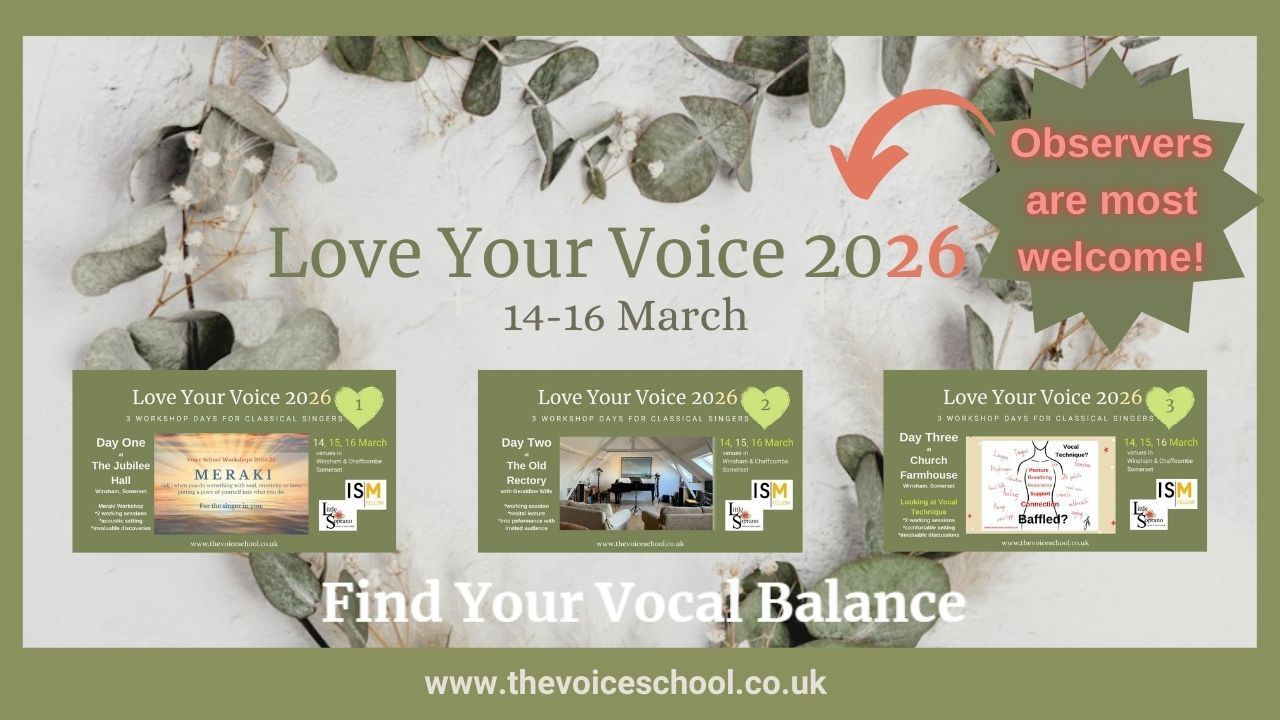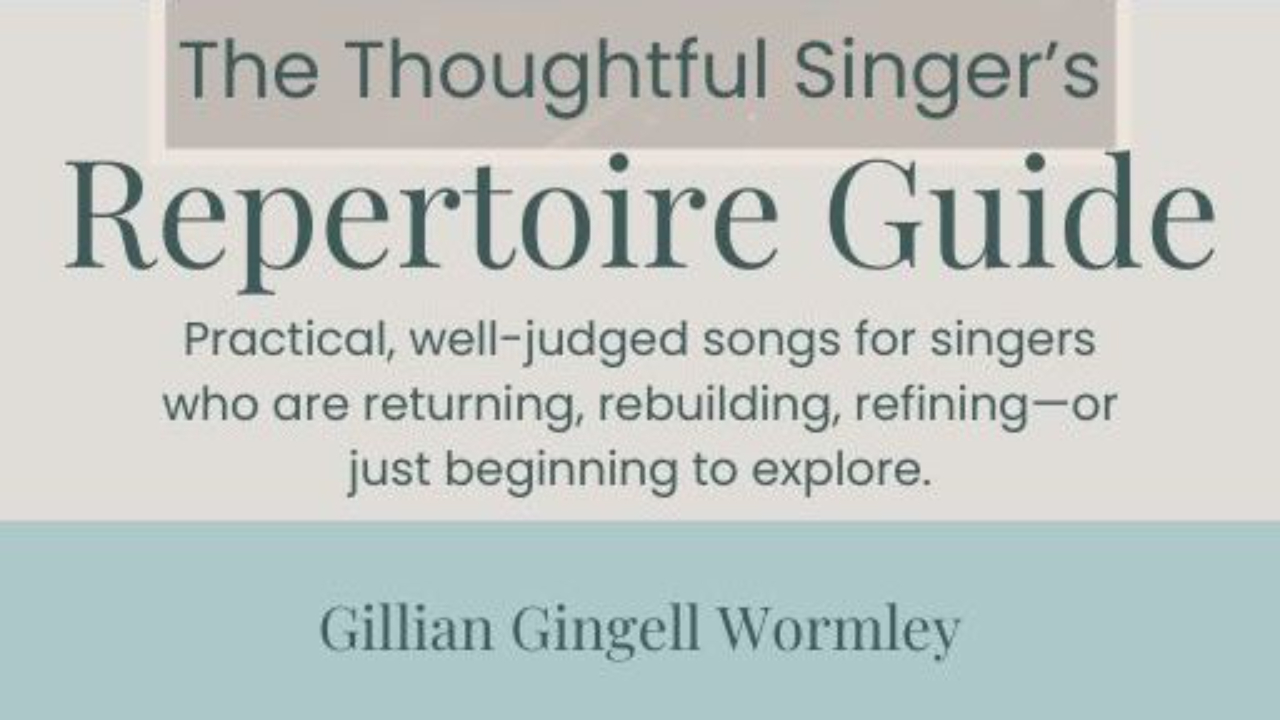Voice worries: is your voice cracking up? Are nodules a concern?

Take care of your voice
I hope you took a look at the video - it's short, but packed with information.
Our unique voice is a valuable asset. It's like a personal brand that sets us apart from others. We should always embrace and cherish it because it's a reflection of our identity. And, we only have one, and it's worth protecting.
I well remember a defining moment in my career about 12 years ago where for the first time I felt unsure of what my voice was doing. It was mid-concert, and I was singing Mozart's Laudate Dominum. It wasn't exactly an out-of-body experience, but I felt like I was not vocally in control - my voice, normally so reliable, clear and sure, wavered for a moment. It's true I was stressed, and a bit pressured by life at that time - and my voice, for the first time faltered. I've never forgotten that moment since. Not nodules, but a sign that my voice was under stress and that I needed to take care.
Imagine those little vocal folds, pristine and perfect at birth. Functioning with ease and as usual in babies and young children, with the best and most perfect vocal connection, there can be. What causes things to go wrong when all was perfect at the onset?

True vocal folds are no bigger than your little fingernail. They deserve careful use if they are to serve us well all our lives. Sometimes things go wrong, usually as a result of a poorly mixed cocktail of factors.
Does this sound familiar?
Worse still, if this is something you are concerned about, you might gain some insight and help from reading about Susan’s story and what happened back in 2013 when she had a brush with vocal nodules.
Suze was then a student at Nottingham Trent University who came to me for singing lessons. Back in November 2012, she was fed up and tired of intermittently having little or no voice.
A keen and capable singer, a reliable Alto, musical, confident, committed - Susan was at the end of her tether with her voice barely being able to sing anything beyond the B above middle C. We had discussed it at length in lessons. She was tired, stressed, and anxious about potentially losing her singing voice. We backtracked to basic vocal technique, taking care with posture, breathing, onset of sound and support issues. We switched to songs with ranges that didn’t overwork the voice.
Suze decided to get the problem professionally looked at by an ENT consultant and after her first appointment she told me in an email:
I had my ENT appointment today and they have found that I have anterior nodules - I think that’s what they’re called. I have to have voice therapy for the next two months as they try to shrink them down. They think they’ll be able to as they are relatively new and soft still and won’t need surgery. I’m not allowed to shout and speak above normal talking levels but to carry on singing lessons with all the stuff we’ve been doing - not stretching my range, or pushing it, but keeping it going. But I have to stop choir for a while so I don’t end up over using it.
Dealing with vocal problems can be one of the biggest challenges for singers. Issues such as hoarseness or breathy tone, vocal strain, difficulty hitting notes, and reduced vocal range can all arise from a variety of factors, including stress, ageing, illness, injury, or as is so very often, improper technique. It's crucial to address these problems as soon as possible to avoid lasting damage to the voice, regardless of what's causing them.
Suze went on to share more:
I then went to see the speech therapist, Susanne, who explained that I would need 'vocal therapy’ which would involve more cameras and finding the root of the problem, breaking the habits and putting them right. She then told me for the next 8 weeks I can’t:
- raise my voice above quiet talking - so no unnecessary singing (very difficult)
- no choir
- no shouting from room to room
- no talking in loud environments - bars, clubs, restaurants
- no talking over music or television
I have to drink lots of water and daily steaming. I am allowed to keep my singing lessons to keep everything moving as long as I don’t strain my voice or push it too hard.
Education is key to living with my problem. Understanding how my voice works, and why it is doing what it is doing has been key. I need to be very disciplined with the way I sing, but this is fast becoming second nature - gentle practice definitely pays off!
It's important to note here, that Suze wasn't advised to stop singing during her treatment, a nod to the vocal teaching she was receiving and that I was guiding her well. I am bound to be biased of course - but understanding how the voice works and why these vocal problems arise in the first place is a bit of a mission for me. If you've watched the video above, there are many more on my YouTube Channel.
I’m not saying that enthusiasm for singing should be held back. I am saying that there should be greater care given, knowledge applied, guidance delivered and wisdom shared. Period.
If Suze’s story is something you recognise, or if you are suffering or have suffered from similar vocal problems as a singer, do something about it now.
With the correct approach, it is possible to continue singing, to continue rebuilding, and strengthening your vocal process with carefully constructed vocal exercises and a better understanding.
- Warm up the vocal cords/folds with gentle exercises such as lip trills or humming before singing.
- Maintaining and understanding good posture while singing is also important.
- Correct breathing techniques and use of airflow can help reduce pressure on the vocal cords, making it easier to sing without strain.
- Staying hydrated by drinking plenty of water throughout the day is essential. Dehydration can dry out the natural mucus lining the vocal cords, making them more vulnerable to strain and injury.
How I can best help you?
- Get a good grasp of the basics - the 5 Essentials. These very simple principles/steps/principles underpin all the vocal technique there is to know. See below ...
- Weekend courses - come and sing at one of my workshop events, get involved!
- Get some guidance - consider joining a mentoring group/community.
Curious about singing basics? Let's get you started with the right learning tools.
Download my free need-to-know vocal essentials guide for singers, vocal technique principles simply explained.







